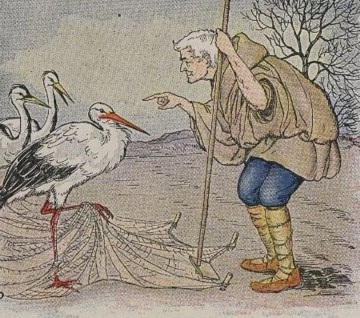PART A_1
Let’s learn vocabulary. Listen and repeat the words and the sentences with your tutor.
PART A_2
| 1. newly | /NOO-lee/ |
| -recently; lately: | |
| The newly painted building looks as good as the new buildings around it. | |
| 2. spare | /spair/ |
| -to refrain from harming or destroying; leave uninjured; forbear to punish, hurt, or destroy | |
| A group of illegal loggers spared the old oak tree in the middle of the forest. | |
| 3. plead | /pleed/ |
| -to appeal or entreat earnestly: | |
| The young protesters pleaded to be released from jail. | |
| 4. punishment | /PUHN-ish-muhnt/ |
| -the act of punishing. | |
| Human rights advocates are against physical punishment. | |
| 5. company | / KUHM-puh-nee/ |
| -companionship | |
| A stray cat kept the homeless man company. |
PART B_1
Let’s read the story. Please read them aloud, and I will check your pronunciation and intonation.
PART B_2
THE FARMER AND THE STORK

A Stork of a very simple and trusting nature had been asked by a gay party of Cranes to visit a field that had been newly planted. But the party ended dismally with all the birds entangled in the meshes of the Farmer’s net.
The Stork begged the Farmer to spare him.
“Please let me go”, he pleaded. “I belong to the Stork family who you know are honest and birds of good character. Besides, I did not know the Cranes were going to steal.”
“You may be a very good bird”, answered the Farmer, “but I caught you with the thieving Cranes and you will have to share the same punishment with them.”
You are judged by the company you keep.
PART C_1
Let’s answer comprehension questions. Please answer them based on the story.
PART C_2
| 1. | How was the Stork described in the story? |
| 2. | What happened to the birds during their visit to the field? |
| 3. | How did the Farmer react when the stork asked him to be spared? |
PART D_1
Let’s discuss the story. Please answer the questions below and express your opinions.
PART D_2
| 1. | If you were the Stork, would you accept the cranes’ invitation? Why or why not? |
| 2. | If you were one of the cranes, how would you react after the stork’s conversation with the Farmer? |
| 3. | If you were the Farmer, would you let the stork go? Why or why not? |
| 4. | The fable’s lesson is “You are judged by the company you keep.” Do you agree with this? Please explain. |
| 5. | How do you choose your friends? |
REVIEW AND FEEDBACK
Now, let us review the things that you learned in this lesson.
ではこのレッスンで学んだことを振り返りましょう。
(Please give a short feedback on how your student did on your class.)
| Grammar 文法 |
Pronunciation 発音 | Vocabulary 単語 |
Comprehension 理解 |
|
|---|---|---|---|---|
 GOOD GOOD |
文法の誤りはほとんどなく、完全な文章で話すことができる | ほとんどの単語をはっきりと正しく発音することができる | 習った表現を適切に使うことができる | 文章を理解し、質問に正しく答えることができる |
 FAIR |
文法の誤りはあるが、完全な文章で話すことができる | 発音の練習が必要な言葉がいくつかある | たまにミスはあるが、習った表現を適切に使うことができる | 文章を完全に理解するのは難しく、質問に正しく答えられないときもある |
 POOR |
文章で話すのは難しく、単語だけで話すことができる | 発音の練習が必要である | 習った単語と表現を少しだけ使うことができる | 文章を理解するのは難しく、質問に答えるのは難しい |
Parts of this lesson material are based on:
An eBook from The Project Gutenberg.
This eBook is for the use of anyone anywhere at no cost and with almost no restrictions whatsoever. You may copy it, give it away or re-use it under the terms of the Project Gutenberg License included with this eBook or online at www.gutenberg.org
An eBook from The Project Gutenberg.
This eBook is for the use of anyone anywhere at no cost and with almost no restrictions whatsoever. You may copy it, give it away or re-use it under the terms of the Project Gutenberg License included with this eBook or online at www.gutenberg.org